Dragon
Boat Festival, also known as Dragon Boat Festival, Dragon Boat Festival,
Chongwu Festival, Dragon Festival, Zhengyang Festival, Tianzhong Festival, etc.
The Dragon Boat Festival originated from the worship of celestial phenomena and
evolved from the dragon sacrifice in ancient times. In the midsummer Dragon
Boat Festival, the Canglong Qi Su soared to the south of the sky, which is the
auspicious day of Long Feitian. The origin of the Dragon Boat Festival covers
ancient astrological culture, humanistic philosophy and other aspects, and contains
profound cultural connotations.
The
Dragon Boat Festival has mixed a variety of folk customs in the inheritance and
development, and the customs of the Dragon Boat Festival are very rich. Dragon
boat racing and eating zongzi are the two customs of the Dragon Boat Festival.
These two customs have been passed down in China since ancient times and have a
long history. These two customs still remain.
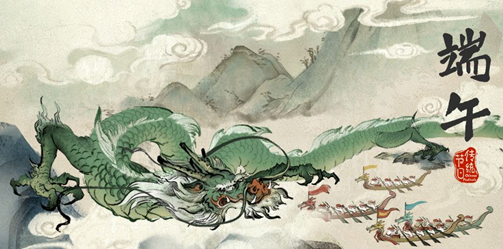
The
Dragon Boat Festival was originally a festival founded by the ancestors of
Wuyue in the south to worship the dragon ancestors and pray for blessings and
evil spirits. It is said that Qu Yuan, a poet of Chu during the Warring States
Period, committed suicide by jumping on the Miluo River on May 5. Later, people
also took the Dragon Boat Festival as a festival to commemorate Qu Yuan.
The
Dragon Boat Festival, the Spring Festival, the Ching Ming Festival, and the
Mid-Autumn Festival are also known as the four major traditional festivals in
China. The Dragon Boat Festival culture has extensive influence in the world,
and some countries and regions in the world also have activities to celebrate
the Dragon Boat Festival. In May 2006, the State Council included it in the
first batch of national intangible cultural heritage lists. Since 2008, the
Dragon Boat Festival has been listed as a national legal holiday. In September
2009, UNESCO formally approved its inclusion in the "List of
Representative Works of Intangible Cultural Heritage of Humanity" and the
Dragon Boat Festival became China's first festival to be selected as a World
Intangible Heritage.
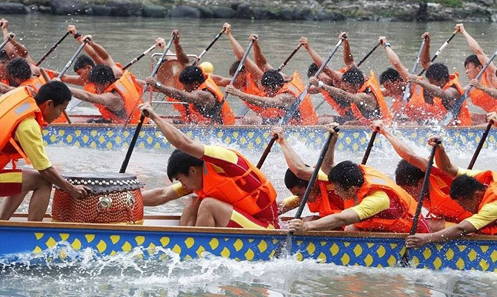
According
to "Records of the History", Qu Yuan was a native of Chu at the end
of the Warring States Period and the minister of Chu Huai Wang during the
Spring and Autumn Period. According to legend, Qu Yuan advocated appointing the
talents and empowering the country, making the country strong, and urging to
unite against Qin, which was strongly opposed by the nobleman Zilan and others.
Qu Yuan was framed and removed from his post, was driven out of the capital,
and exiled to the Yuan and Hunan basins.
During
his exile, he wrote poems such as "Li Sao", "Heaven
Questions", and "Nine Songs" that were concerned about the
country and the people. In 278 BC, the Qin army broke through the capital of
Chu Kingdom. Qu Yuan saw that his homeland was invaded and his heart was cut,
but he could not bear to abandon his homeland. On May 5th, after writing his
masterpiece "Huaisha", he took a stone to throw himself at the Miluo
River and wrote a magnificent patriotic movement with his own life.
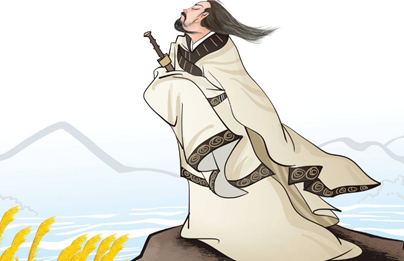
After
Qu Yuan plunged into the river, the local people immediately rowed boats for
rescue. However, Qu Yuan's body was never recovered. In order to convey their
sorrow, people rowed on the river, and then gradually developed into a dragon
boat race. The people were afraid that the fish in the river would eat his
body, so they went home and brought rice balls into the river to prevent the
fish and shrimps from ruining Qu Yuan's body. Later, it became the custom of
eating zongzi. The Chinese people associate the dragon boat race and the eating
of rice dumplings on the Dragon Boat Festival with the memory of Qu Yuan.
Dragon
Boat Festival also has many folk customs, and dragon boat racing is one of
them. Dragon boat racing is an important activity of the Dragon Boat Festival.
As early as 7000 years ago, ancient ancestors used wood to make canoes and
rowed them with wooden oars. The dragon boat was originally a canoe carved in
the shape of a dragon on a single wooden boat, and later developed into a
dragon-shaped boat made of wood. Dragon boat racing has a long history and is a
multi-person group paddling competition. The dragon boat race is divided into
several sections: invite the dragon, worship the dragon god, roam the dragon
and collect the dragon. Before the Dragon Boat Festival, you must choose
auspicious days to start from the water. After worshipping the gods, install
the dragon head and dragon tail, and then prepare for the race.
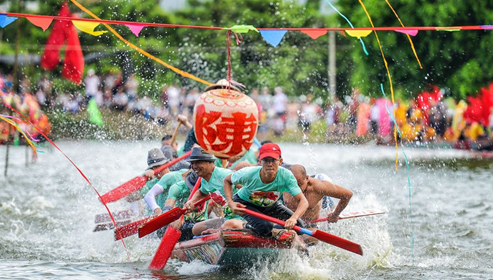
The
Dragon Boat Festival has a long history of arranging various flowers and plants
that can drive away evil spirits and cure diseases. People regard wormwood and
calamus as one of the important contents of the Dragon Boat Festival. Wormwood
is an important medicinal plant. It can also be used to make moxa to treat
diseases, moxibustion points, and repel worms. People often hang a few wormwood
at the door of their homes. Because of the special fragrance of wormwood,
people use it to repel diseases, mosquitoes and evil spirits.
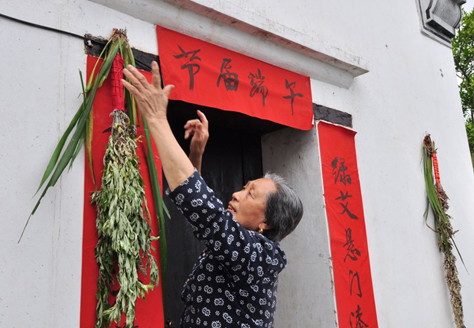
The
main materials of zongzi are glutinous rice and fillings, which are wrapped in
ruo leaves. They have various shapes, including sharp corners and four corners.
Zongzi has a long history and was originally used as a tribute to ancestors and
gods. After being introduced to the north, the rice dumplings were made from
millet, called "corn millet". Due to the different eating habits in
various places, the zongzi has formed a north-south flavor; in terms of taste,
zongzi can be divided into two categories: salty and sweet. The custom of eating
rice dumplings during the Dragon Boat Festival has prevailed in China for
thousands of years. It has become one of the most influential and widely
covered folk eating customs of the Chinese nation, and it has spread to North
Korea, Japan and Southeast Asian countries.
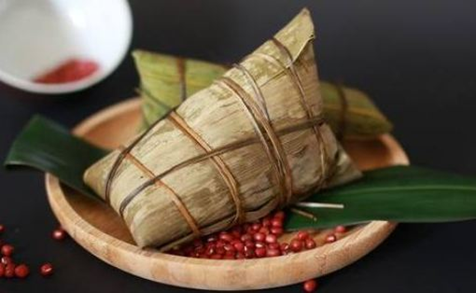
During
the Dragon Boat Festival, people will tie five-color silk threads to their
arms. In traditional Chinese culture, the five colors "blue, red, white,
black, and yellow" that symbolize the five directions and five elements
are regarded as auspicious colors. The Dragon Boat Festival used five-color
silk threads to tie arms, which was once a very popular festival. Passed down
to later generations, they developed into many beautiful ornaments such as
long-lived strands, long-lived locks, sachets, etc., and their production has
become increasingly refined, becoming a unique folk art of the Dragon Boat
Festival. On the Dragon Boat Festival, children should tie five-color silk
threads on their wrists and ankles to drive away evil spirits.
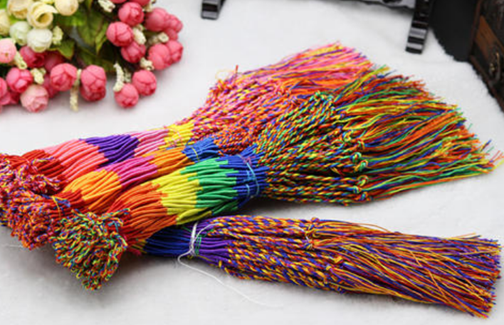
Comment Cancel reply